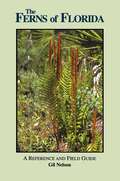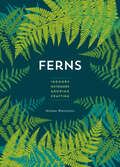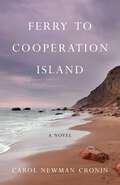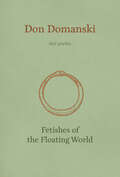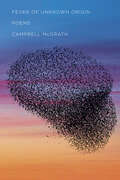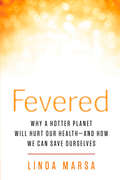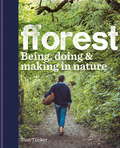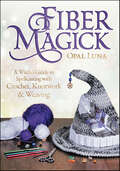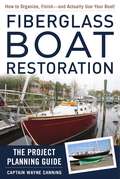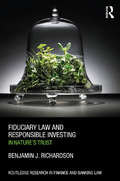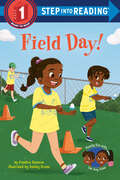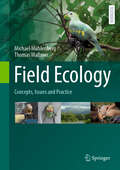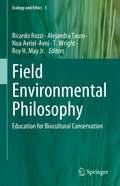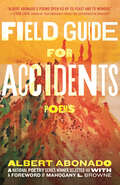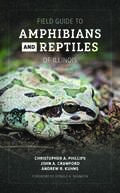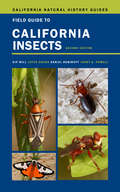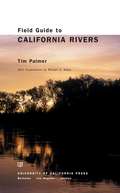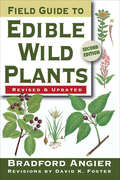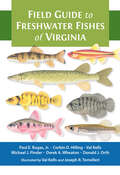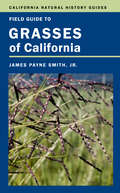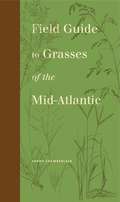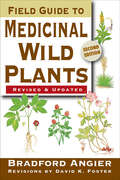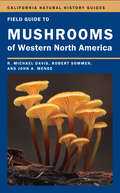- Table View
- List View
Ferns of Florida: A Reference and Field Guide (Reference and Field Guides)
by Gil NelsonThis is the first field guide in 25 years to treat Florida's amazing variety of ferns. Color plates feature more than 200 images, some of which include rare species never before illustrated in color. Includes notes on each species growth form and habit, as well as general remarks about its botanical and common names, unique characteristics, garden use, and history in Florida. All professional or amateur botanists, plant lovers, and gardeners will want this important book in their libraries.
Ferns: Indoors - Outdoors - Growing - Crafting
by Mobee WeinsteinA concise, creative, practical guide to growing these amazing plants, drawn from the award-winning volume The Complete Book of Ferns.A more concise version of The Complete Book of Ferns, focused on practical use for gardeners, Ferns offers botanical information, indoor and outdoor growing and care information, details on propagation, display ideas, and even craft projects. With numerous color photos, it will help you add a new dimension to your home or backyard garden reflecting the beauty and wide variety of this hardy plant that dates back to before the time of the dinosaurs.Acclaim for The Complete Book of FernsWinner of an American Horticultural Society Book Award“A lovely and multifaceted exploration . . . as useful as it is educational.” —Publishers Weekly
Ferry to Cooperation Island: A Novel
by Carol Newman CroninLoner James Malloy is a ferry captain—or used to be, until he was unceremoniously fired and replaced by a girl named Courtney Farris. Now, instead of piloting Brenton Island&’s daily lifeline to the glitzy docks of Newport, Rhode Island, James spends his days beached, bitter, and bored. When he discovers a private golf course staked out across wilderness sacred to his dying best friend, a Narragansett Indian, James is determined to stop such &“improvements.&” But despite Brenton&’s nickname as &“Cooperation Island,&” he&’s used to working solo. To keep rocky bluffs, historic trees, and ocean shoreline open to all, he&’ll have to learn to cooperate with other islanders—including Captain Courtney, who might just morph from irritant to irresistible once James learns a secret that&’s been kept from him for years. This salt-sprayed fourth novel by 2004 Olympic Sailor Carol Newman Cronin celebrates wilderness and water, open space and open-mindedness, and the redemptive power of neighborly cooperation.
Fetishes of the Floating World
by Don DomanskiGovernor General's Award–winning poet Don Domanski's posthumous last collection once again melds perception-expanding environmental poetry and metaphysics into a seamless, moving lyric whole. Fetishes of the Floating World continues Don's lifelong exploration of mystical ecology. It is an invitation to experience the sacred dimensions of what-is and to become more intimate with the strangeness that haunts our lively, changeable world. Here is a spirituality that doesn't turn its back on the material and immerses us in earthly being. The sustained apprehension of deep time underlies every moment of this work; every moment is held up against that more-than-human span and is relinquished to it. Domanski's full-bodied, incantatory language will penetrate your very marrow, calling you out of yourself to testify to the world's "inclement graces." "Domanski’s poems are intimate, but intimate on a grand scale. As far as I am concerned, there is no better poet writing in English."–Mark Strand on All Our Wonder Unavenged
Fever of Unknown Origin: Poems
by Campbell McGrathA collection of profound and piercing poems from a finalist for the Pulitzer Prize about navigating the modern world in search of beauty that will endureFever of Unknown Origin opens at a remote crossroads, where the speaker considers the intersection of history, beauty, and destruction: &“the past / is paper / and the present, a match . . .&” What follows is an urgent tour of landscapes—environmental, political, and personal—that reframes our perception of modern America and leads the reader into &“An empire of rags and photons&” where we must look to the past to clarify our futures.With sublime wit and a Whitmanian eye, McGrath delivers a stunning collection of warnings, love letters, and praise songs for all that manages to weather the perennial pressures of time: frog ponds, stadium rubble, and the endless cycle of seasons, which usher us deeper into an era we cannot yet know.
Fevered: Why a Hotter Planet Will Hurt Our Health -- and how we can save ourselves
by Linda MarsaBeyond images of emaciated polar bears and drought-cracked lakes, there remains a major part of climate change's impact that the media has neglected: how our health will suffer from higher temperatures and extreme weather. From spiraling rates of asthma and allergies and spikes in heatstroke-related deaths to swarms of invasive insects carrying diseases like dengue or West Nile and increases in heart and lung disease and cancer, the effect of rising temperatures on human health will be far-reaching, and is more imminent than we think.In Fevered, award-winning journalist Linda Marsa blends compelling narrative with cutting-edge science to explore the changes in Earth's increasingly fragile support system and provide a blueprint—a "medical Manhattan Project"—detailing what we need to do to protect ourselves from this imminent medical meltdown. In the tradition of Rachel Carson's Silent Spring, Marsa sounds the alarm on a subject that has largely been ignored by governments and policy makers, and persuasively argues why preparedness for the health effects of climate change is the most critical issue affecting our survival in the coming century.
Fforest: Being, Doing & Making in Nature
by Sian TuckerCalming to the soul and good for us all, spending time outdoors offers us precious breathing space away from the stresses and strains of modern life. This inspirational guide celebrates the life enhancing effect of nature and encourages you to try the pursuits that would have been second nature to previous generations - from walking in the dark with only the light of the moon and stars to guide you, to wild swimming, forest bathing and sleeping under canvas. It will inspire you to re-discover the joy of sky and clouds, night and tides, stars and silence. <P><P>Photography by Finn Beales
Fiber Magick: A Witch's Guide to Spellcasting with Crochet, Knotwork & Weaving
by Opal Luna70+ Craft Projects to Spark Your Imagination & Enhance Your Magick Featuring over 100 color photos and illustrations, this fun and accessible guide introduces you to the magickal power of crochet, knotwork, and other fiber crafts. Witch and crochet expert Opal Luna shows you how to move spiritual intention from your mind into your hands through practical exercises, creative techniques, and patterns for more than seventy projects.Improving your magick through fiber arts is easy with Opal's step-by-step instructions and empowering guidance. Discover the tools of the trade, the power of color, and a variety of weaving, braiding, and knotting methods. Learn how to connect to deities and create sacred space for your practice. Explore how Fiber Magick can be used in your holiday celebrations and rites of passage. From sigils and yarn amulets to prayer shawls and crocheted poppets, Fiber Magick is full of delightful projects and perfect for practitioners of all skill levels.
Fiberglass Boat Restoration: The Project Planning Guide
by Captain Wayne CanningHow to select a boat, plan your project, finish the job, and actually head for the water.Over the past thirty to forty years boat builders, large and small, have produced tens of thousands of fiberglass boats. Many now sit abandoned, waiting for some tender care to get back on the water where they belong. Fiberglass unlike many other types of boatbuilding materials does not rot, rust, or break down over the years. Many people have realized this, of course, and have started what they think will be an easy project. They were wrong, and many well-intentioned renovations sit abandoned.Whatever the reason for wanting to take on the restoration of a project boat, proper planning and organization can make the difference between success and failure. Fiberglass Boat Restoration is about how to plan, organize and successfully complete a project boat restoration. It will explain why it is important to put your efforts and resources into some areas and not others. It contains valuable information about what to look for when considering the purchase of a project boat. Although the focus of the book is fiberglass, the information will be useful to anyone undertaking the building or restoration of any boat.
Fiduciary Law and Responsible Investing: In Nature’s trust (Routledge Research in Finance and Banking Law)
by Benjamin J. RichardsonThis book is about fiduciary law’s influence on the financial economy’s environmental performance, focusing on how the law affects responsible investing and considering possible legal reforms to shift financial markets closer towards sustainability. Fiduciary law governs how trustees, fund managers or other custodians administer the investment portfolios owned by beneficiaries. Written for a diverse audience, not just legal scholars, the book examines in a multi-jurisdictional context an array of philosophical, institutional and economic issues that have shaped the movement for responsible investing and its legal framework. Fiduciary law has acquired greater influence in the financial economy in tandem with the extraordinary recent growth of institutional funds such as pension plans and insurance company portfolios. While the fiduciary prejudice against responsible investing has somewhat waned in recent years, owing mainly to reinterpretations of fiduciary and trust law, significant barriers remain. This book advances the notion of ‘nature’s trust’ to metaphorically signal how fiduciary responsibility should accommodate society’s dependence on long-term environmental well-being. Financial institutions, managing vast investment portfolios on behalf of millions of beneficiaries, should manage those investments with regard to the broader social interest in sustaining ecological health. Even for their own financial self-interest, investors over the long-term should benefit from maintaining nature’s capital. We should expect everyone to act in nature’s trust, from individual funds to market regulators. The ancient public trust doctrine could be refashioned for stimulating this change, and sovereign wealth funds should take the lead in pioneering best practices for environmentally responsible investing.
Field Day! (Step into Reading)
by Candice RansomGet ready for some outdoor fun in this Step 1 book that's perfect for readers ages 4-6! Join the Day kids as they gear up for field day at school.What's more fun than field day? The Day kids are so excited! They gobble their breakfast and race to the bus. So many fun things are waiting for them! Spoon-and-egg race! Face-painting! Kickball! A bouncy castle! Brother and sister can't wait! Step 1 Readers feature big type and easy words. Rhymes and rhythmic text paired with picture clues help children decode the story. For children who know the alphabet and are eager to begin reading.A day with family is always a great day! Read all the DAY family books:Apple Picking Day!Pumpkin Day!Garden Day!Beach Day!School Day!
Field Ecology: Concepts, Issues and Practice
by Michael Mühlenberg Thomas WaßmerThis book is a theoretical and practical guide to ecological work in the field, focusing on concepts, issues, and practical applications in animal ecology. By highlighting examples, it provides students, researchers, and professionals with the tools to develop ecological questions and corresponding working hypotheses. It offers guidelines to choose the appropriate methods for successful data collection and analysis. The book focuses on methods for assessing biodiversity and habitats in a changing world, relating specifically to conservation issues and concerns. The book includes a Foreword written by Charles J. Krebs.
Field Environmental Philosophy: Education for Biocultural Conservation (Ecology and Ethics #5)
by Ricardo Rozzi Roy H. May T. Wright Alejandra Tauro Noa Avriel-AvniThis fifth volume in the Ecology and Ethics series integrates key concepts of the previous four volumes by addressing biocultural conservation through novel educational methods. In Field Environmental Philosophy (FEP), the authors undertake two complementary tasks. First, they address a problematic facet of education as an indirect driver of a global change and biocultural homogenization. Second, they contribute to solve the former problems by introducing the FEP method as well as other educational approaches from around the world that value and foster conservation of biological and cultural diversity. A particular emphasis is therefore on the integration of sciences, arts, humanities, and ethics into educational practices that involve the participation of local communities with their diverse forms of ecological knowledge and practices. The book is divided into four parts. Part I introduces FEP concepts and practices that involve a 4-step cycle of transdisciplinary research, poetic communication through composition of metaphors, design of field activities guided with an ecological and ethical orientation, and participation in biocultural conservation activities. Part II exposes problems as well as solutions in formal education (from preschool to higher education) and non-formal education to respect biocultural diversity. Parts III & IV provide case studies developed at long-term socio-ecological research (LTSER) sites, botanical gardens, and other platforms for non-formal education that contribute to biocultural conservation.This book supports a paradigm shift addressing still understudied indirect drivers of global change to foster the conservation of biological and cultural diversity. It is a valuable asset for scientists and practitioners in science and humanities education.
Field Guide for Accidents: Poems (National Poetry Series #9)
by Albert AbonadoSELECTED BY MAHOGANY L. BROWNE FOR THE NATIONAL POETRY SERIESAn irreverent poetry collection that wrestles with questions of family, mortality, cultural history, and identity from the Filipinx-American experience "you showed him your teeth, you dared him to look into your mouth to see the metal bands straightening your jaw into an American smile."—from Field Guide for AccidentsBorn in the United States to Filipino immigrants, poet Albert Abonado is no stranger to the language of periphery. Neither wholly &“American&” nor Filipino, Field Guide for Accidents&’s speakers are defined by what they are not: not white enough to be born in America, not Asian enough to feel at home in the Philippines. Abonado&’s poetry illuminates the strange and surreal in domestic routine, suturing wounds of love, grief, and the contradiction of being Filipinx-American, two identities bound with a hyphen that resists negation. What results is a growing exposure to a world mired in paradox.The poems in Field Guide for Accidents experiment with the constraints of the poetic line, shaping forms that exhume what tend to haunt us in the silence. In Field Guide for Accidents, memory becomes augmented with the imaginary; suspicion collides with superstition, while spirituality crosses paths with scientific fact. A mother returns to her son as a boat. A stew is prepared with blood yet masked as chocolate. The living eat with the dead in memories built like houses. Mythic, bloodthirsty creatures in Pinoy folklore prey on an exhausted poet. Research conducted in hindsight provides new avenues to explore regret.For many third-culture kids of the Asian-American diaspora, there is no such thing as a success story for &“fitting in.&” What matters more is finding where you belong. Spooning images from hand to mouth, the poems in Field Guide for Accidents struggle with what it means to consume and be consumed by American culture.
Field Guide to Acadia National Park, Maine
by Russell D. ButcherThe 42,000 acres that comprise Acadia National Park include glacier-worn granite mountains, rocky cliffs, crystal blue ponds and lakes, and a dramatic coastline where waves collide spectacularly with dramatic headlands. This book describes the flora, fauna, and geology of the park, as well as a number of the prominent trails that take you in and around some of the most charming scenery in North America.
Field Guide to Amphibians and Reptiles of Illinois
by Christopher A. Phillips John A. Crawford Andrew R. KuhnsThe second edition of the Field Guide to Amphibians and Reptiles of Illinois offers up-to-date information on the state’s 102 species of frogs and toads, salamanders, turtles, lizards, and snakes. Detailed descriptions by the authors include habitats, distinguishing features, behaviors, and other facts, while revised range maps and full-color photographs help users recognize animals in the field. In addition, an identification key and easy-to-navigate page layouts guide readers through extensive background material on each species' population, diet, predators, reproduction, and conservation status. A one-of-a-kind resource, the Field Guide to Amphibians and Reptiles of Illinois is a definitive guide aimed at biologists, teachers, students, wildlife specialists, natural resource managers, conservationists, law enforcement officials, landowners, hobbyists, and everyone else eager to explore herpetology and nature in the Prairie State.
Field Guide to California Insects: Second Edition (California Natural History Guides #111)
by Kip WillBeautifully illustrated and approachable, this is the only California-specific, statewide book devoted to all groups of insects. Completely revised for the first time in over 40 years, Field Guide to California Insects now includes over 600 insect species, each beautifully illustrated with color photographs. Engaging accounts focus on distinguishing features, remarkable aspects of biology, and geographical distribution in the state. An accessible and compact introduction to identifying, understanding, and appreciating these often unfamiliar and fascinating creatures, this guide covers insects that readers are likely to encounter in homes and natural areas, cities and suburbs, rural lands and wilderness. It also addresses exotic and invasive species and their impact on native plants and animals. Field Guide to California Insects remains the definitive portable reference and a captivating read for beginners as well as avid naturalists.
Field Guide to California Rivers
by Tim PalmerAward-winning author, naturalist, and conservationist Tim Palmer presents the world of California rivers in this practical and inspiring field guide. Loaded with tips on where to hike, fish, canoe, kayak, and raft, it offers an interpretive approach that reveals geology, plant and wild life, hydrologic processes, and other natural phenomena. Palmer reports on conservation with a perspective from decades of personal engagement. More than 150 streams are featured, 50 riparian species are illustrated, and 180 photos show the essence of California's rivers. Palmer brings a natural history guide, a recreation guide, and an introduction to river ecology together in one illuminating volume; it belongs in every river lover's book collection, boat, and backpack.
Field Guide to Edible Wild Plants
by Bradford AngierRevised and updated: The classic illustrated reference for today&’s foragers. With essential information on each plant&’s characteristics, distribution, and edibility, as well as updated taxonomy and eighteen new species, this is the second edition of Field Guide to Edible Wild Plants—the practical handbook for finding, preparing, and eating plants growing in the wild. This guide to North American wild edibles has been a nature classic for over thirty years. Now David K. Foster revises Bradford Angier&’s invaluable foraging reference. Scientific information for a general audience and full-color illustrations combine with intriguing accounts of the plants&’ uses, making this a practical and informative resource for modern-day foragers.
Field Guide to Freshwater Fishes of Virginia
by Corbin D. Hilling Valerie A. Kells Michael J. Pinder Derek A. Wheaton Paul E. Bugas Jr. Donald J. OrthA beautifully illustrated guide to the diverse and numerous freshwater fish species in Virginia.In Field Guide to Freshwater Fishes of Virginia, the foremost experts on Commonwealth fishes bring their decades of field experience to readers, offering a complete reference to the fishes of the entire state of Virginia. Gathering information that until now could only be found scattered across numerous reference works and online databases, this book provides everything you need to know to identify fish families and species in the Virginia region. Covering how to collect, handle, observe, conserve, and protect these unique fishes, the book's key features include • more than 175 vibrant, full-color illustrations, set side by side with descriptions of each fish• helpful line drawings that depict the most reliable diagnostic characteristics for field identifications (e.g., snout shape, pigment patterns, mouth morphology)• descriptions of Virginia's freshwater habitats • examples of incredible fish spawning and feeding behavior• tips on observing fish in the wild and in captivity• a chapter on the taxonomy of family and common names of the fish species most common throughout Virginia• up-to-date fish distribution maps• a complete glossary of termsProviding a fascinating foray into the wonders of the Commonwealth's swimmers, Field Guide to Freshwater Fishes of Virginia will appeal to scientists, naturalists, teachers, native fish aquarists, students, anglers, and fish collectors.
Field Guide to Grasses of California
by James P. Smith Jr.Grasses and grasslands are of increasing interest to conservationists, biologists, and gardeners. There are more than 300 species of native California grasses and they are found in almost every climate--from cool, wet forests to hot, dry deserts. Native grasses are also important to land restoration as they improve soil quality, increase water infiltration, and recycle nutrients. Their deep roots can tap soil water, which allows them to stay green year-round and to act as fire buffers around residences. Native grasses also provide vital habitat for many species of insects, birds, reptiles, and mammals. Despite their importance, grasslands remain one of the most underprotected of California's vegetation types, and native grasslands have undergone the greatest percentage loss of any habitat type in the state. Grasses are also among the most difficult plants to identify. Organized alphabetically, Field Guide to Grasses of California covers common native and naturalized grasses and, to help identify them, also features over 180 color illustrations.
Field Guide to Grasses of the Mid-Atlantic (Keystone Books)
by Sarah ChamberlainGrasses are among the most ubiquitous plants on the planet. They inhabit a wide geographic range and are found in a variety of natural habitats. The small parts of the grass flower and specialized terminology, however, can make identifying grasses a challenging endeavor. Sarah Chamberlain’s Field Guide to Grasses of the Mid-Atlantic makes identification simpler for everyone—regardless of their previous botanical knowledge.Featuring an easy-to-use dichotomous key, this is a user-friendly guide to more than 300 types of grasses found from the Blue Ridge Mountains and southern plains to the Appalachians and the Allegheny Plateau. Each major entry contains detailed species diagrams as well as common names, habitats, and distribution. The book’s opening sections outline the parts of grass flowers and describe stem, leaf, and sheath characteristics.With a wealth of illustrations, instructions on how to use the key, and a glossary of terms, Field Guide to Grasses of the Mid-Atlantic is an indispensable reference for naturalists and conservationists, botanists, land management professionals, and students and scholars of mid-Atlantic flora.
Field Guide to Grasses of the Mid-Atlantic (Keystone Books)
by Sarah ChamberlainGrasses are among the most ubiquitous plants on the planet. They inhabit a wide geographic range and are found in a variety of natural habitats. The small parts of the grass flower and specialized terminology, however, can make identifying grasses a challenging endeavor. Sarah Chamberlain’s Field Guide to Grasses of the Mid-Atlantic makes identification simpler for everyone—regardless of their previous botanical knowledge.Featuring an easy-to-use dichotomous key, this is a user-friendly guide to more than 300 types of grasses found from the Blue Ridge Mountains and southern plains to the Appalachians and the Allegheny Plateau. Each major entry contains detailed species diagrams as well as common names, habitats, and distribution. The book’s opening sections outline the parts of grass flowers and describe stem, leaf, and sheath characteristics.With a wealth of illustrations, instructions on how to use the key, and a glossary of terms, Field Guide to Grasses of the Mid-Atlantic is an indispensable reference for naturalists and conservationists, botanists, land management professionals, and students and scholars of mid-Atlantic flora.
Field Guide to Medicinal Wild Plants
by Bradford AngierA revision of the definitive reference, containing plant characteristics, distribution, and medicinal qualities, an updated taxonomy, and fifteen new species. The Field Guide to Medicinal Wild Plants is the ultimate handbook for identifying and using wild plants for medicinal purposes. This illustrated guide to North American wild medicinals has been a nature classic for over thirty years. In this second edition, David K. Foster revises Bradford Angier's invaluable reference, updating the taxonomy and adding more than a dozen species, including the purple coneflower, popularly known as echinacea, as well as ephedra, jewelweed, goldenseal, and more. Scientific information for a general audience and full-color illustrations combine with intriguing accounts of the plants&’ uses, making this a practical guide for anyone interested in the medicinal uses of wild plants.
Field Guide to Mushrooms of Western North America
by R. Michael Davis John A. Menge Robert SommerCalifornia and the Western States are rich in abundant and diverse species of mushrooms. Amateur mushroom collectors and mycologists alike will find over 300 species of the region's most common, distinctive, and ecologically important mushrooms profiled in this comprehensive field guide. It provides the most up-to-date science on the role of fungi in the natural world, methods to identify species, and locations of mushroom habitats. With excellent color illustrations showing top and side views of mushrooms of the Western States and a user-friendly text, it is informative but still light enough to be carried into the woods. When used to identify mushrooms, keys bring the reader to individual species, with a descriptive text providing cues for identifying additional species. Mushrooms common in urban landscapes are included, which is especially useful for the casual encounter with backyard fungi. The guide also provides a table of both old and new species names, and information on edibility and look-alikes, both dangerous and benign. A section on mushroom arts and crafts features mushroom photography, painting, philately, spore prints, dyes, and cultivation. The guide also offers a comprehensive list of resources including national field guides, general mushroom books and periodicals, club and society contact information, and web sites. · Primary descriptions and illustrations of 300 species of mushrooms plus text descriptions of many more. · Latest word in mushroom taxonomy and nomenclature. Clear discussion of DNA sequencing and new classifications. · Especially good coverage of southern California and Southwestern mushrooms often neglected in other field guides.
